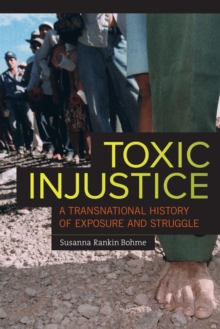
Toxic Injustice : A Transnational History of Exposure and Struggle
The pesticide dibromochloropropane, known as DBCP, was developed by the chemical companies Dow and Shell in the 1950s to target wormlike, soil-dwelling creatures called nematodes. Despite signs that the chemical was dangerous, it was widely used in U.S. agriculture and on Chiquita and Dole banana plantations in Central America. In the late 1970s, DBCP was linked to male sterility, but an uneven regulatory process left many workers-especially on Dole\'s banana farms-exposed for years after health risks were known. Susanna Rankin Bohme tells an intriguing, multilayered history that spans fifty years, highlighting the transnational reach of corporations and social justice movements. Toxic Injustice links health inequalities and worker struggles as it charts how people excluded from workplace and legal protections have found ways to challenge power structures and seek justice from states and transnational corporations alike.
£24.79
Similar Deals

London Map 1000 Piece Puzzle
£16.00
From Stanfords

Shaun the Sheep Championsheep Games
£4.99
From Stanfords

National Geographic Kids Readers: Penguins (National Geographic Kids Readers: Level 2)
£3.99
From Stanfords

Name That Movie: 100 Illustrated Movie Puzzles
£10.99
From Stanfords

On-the-Go Amusements: 50 Fun Things to Do on a Plane
£7.99
From Stanfords

On-the-Go Amusements: 50 Great Things to Do Outside
£7.99
From Stanfords

Those Who Are Loved
£20.00
From Stanfords

Safari, A Photicular Book
£20.00
From Stanfords


